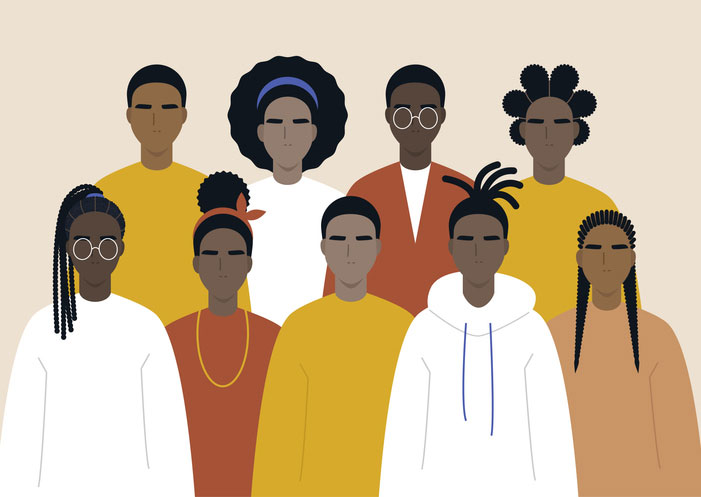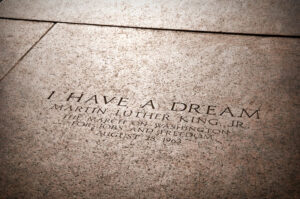

African American studies is the systematic study of the black experience—geographically, socioeconomically, and culturally—that seeks to explore and better understand the African American experience.
Decidedly interdisciplinary, African American studies is grounded in the social sciences, the arts, humanities, and more and is part of the broader liberal arts that’s aimed at examining and scrutinizing the human condition.
Through a variety of intellectual approaches and the use of empirical evidence, African American studies explores communities of African descent around the world. From the U.S. to the Caribbean to Africa, Europe, and beyond, this liberal arts discipline is focused on gaining deeper insight at all levels – locally, nationally, transnationally, and globally.
“In recognizing the humanity of our fellow beings, we pay ourselves the highest tribute.”
~ Thurgood Marshall
Whether you’re looking for an opportunity to advocate for and contribute directly to the African American community, broaden your outlook of the black experience, or enrich your knowledge of the countless contributions African Americans have made to American society, exploring African American studies as a major, minor, graduate program, or as a focus of a liberal arts undergraduate or graduate degree will inspire, enlighten, and offer new perspectives on some of today’s most relevant issues.
A Uniquely American Experience
 African American studies is an engaging course of scholarship that examines a range of complex issues affecting black people around the world. It’s a study on the contemporary black experience, whether in America or elsewhere across the globe, although many programs in African American studies focus primarily on the unique experience of Black people in America – a deep dive into race, equality, and diversity within our democratic society.
African American studies is an engaging course of scholarship that examines a range of complex issues affecting black people around the world. It’s a study on the contemporary black experience, whether in America or elsewhere across the globe, although many programs in African American studies focus primarily on the unique experience of Black people in America – a deep dive into race, equality, and diversity within our democratic society.
African American Studies Courses at the Undergraduate and Master’s Level
 Whether at the undergraduate or graduate level, major or minor, or as focused courses within a broader liberal arts education, African American studies encourages students to explore the plight, triumphs and opportunities unique to the Black experience in American society.
Whether at the undergraduate or graduate level, major or minor, or as focused courses within a broader liberal arts education, African American studies encourages students to explore the plight, triumphs and opportunities unique to the Black experience in American society.
Bachelor’s Degrees in Liberal Arts with a Focus in African American Studies
An undergraduate major, minor, or emphasis in African American studies prepares students with a solid liberal arts foundation and preparation for graduate work in the social sciences and the humanities, including public health, criminal justice, public administration, education, and more. Because African American Studies courses are often natural additions to a liberal arts education, students also often choose to double major or minor in this discipline.
Bachelor’s degree programs in liberal arts that incorporate coursework in African American studies, whether as part of the general curriculum or as a full concentration, provide a broad liberal arts perspective uniquely tailored to the modern world. It lays the foundation for graduate work and career preparation in
- Education
- Journalism
- Law
- Business Management
- Politics
- Psychology
- Social Work
- International Relations
- Urban Planning
Students of these programs come away with valuable critical thinking skills, a more nuanced perspective on the world around them.
Programs in this discipline encourage critical thinking and inspire students to sharpen their analytical and communication skills. Students come away capable of conducting social science research and interpreting scientific data. It’s a meaningful way to develop appreciation for the countless contributions African Americans have made both domestically and globally, without glossing over real issues of race and the black experience.
History, culture, literature, arts, music, politics, religion, and economics are just some of the topics addressed in a bachelor’s level liberal arts program in African American studies. You’ll cover it all, examining:
- Social Institutions
- Political Movements
- Belief Systems
- Spiritual Ideals
- Persistent Issue of Racial Inequality and Racism
Master’s Degrees in Liberal Arts with a Concentration in African American Studies
- An examination of race relations that influence both American culture and society
- An historical examination of the roots and routes of people of African descent
- Comparisons of the black experience in various parts of the world
- Racism and its effects on society and scholarship
- The implications of colonization and trans-Atlantic slavery
- The importance of African American history, culture, and tradition
- The development of black music, performance, literature, and visual culture
- African American social movements and politics
- Contemporary issues in areas such as migration, citizenship, and environment justice
- An examination of topics such as family, gender, sexuality, and class relations within the African American community
African American Studies Courses are At Home at the Top Liberal Arts Colleges
A growing number of colleges and universities now offer African American studies at the bachelor’s, master’s, and doctoral levels.
Most institutions aim to explore how both history and contemporary society have shaped and continues to shape politics, popular culture, and the social movements of African Americans through their African American studies programs.
Mirroring the growing importance of African American studies as part of a liberal arts education, some of the biggest names in higher learning now offer this discipline. Yale, Northwestern, Penn State University, Princeton, and Berkeley are just some of the nation’s top schools to offer both undergraduate and graduate degrees in African American studies, while many more offer it in the curriculum of their liberal arts programs.
Many of these programs are part of larger schools of African American studies that are home to outstanding study abroad opportunities and are staffed with an interdisciplinary faculty of experts who provide a multi-dimensional examination of the black experience in the United States and around the world.
“If there is no struggle, there is no progress.”
~ Frederick Douglass




